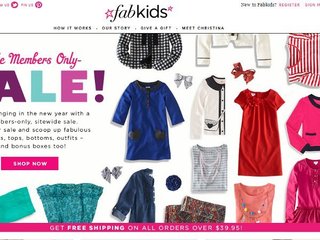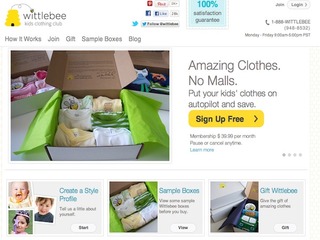

Updated to add information from CEO Rob Rebholz.
I’ve spoken before about my giant baby. At three months, he was in 12-month sized clothes. By six months, he was in 18-month sized clothes. Guess who only bought clothes for 0-6 months. I now have three boxes of baby clothes packed away in the attic and my kid is all of 15 months old.
You can go the attic route, or you can buy and resell shitty clothes at a consignment sale, or you can simplify the process with KinderStuff, a new direct sales e-commerce site for children’s clothing, which offers a discount if you promise to return the items in the future. The company launched its U.S. business today after launching several months ago in Germany.
There are a number of very cool things about this idea, starting with the fact that it is legitimately building its brand around social responsibility. I love it. It makes my bleeding liberal heart explode with glitter and rainbows. First of all, all of the clothes are certified organic. Secondly, they’re made in the U.S. (the company’s German business produces the clothes in Germany). And thirdly, they’re super cute.
Do you know how hard it is to find clothes that are organic, made in the U.S., and cute? It’s f*@#ing hard!
Of course, if you’ve ever bought clothes that are organic and/or made in the U.S. and/or cute, then you’ll know that they’re expensive. You best make sure your kid is going to wear those clothes into college, because they’re the only clothes he’s going to get for a long ass time.
KinderStuff has solved this problem—rather ingeniously, I might add. Since socially responsible clothes are effing expensive, and since your kid is going to outgrow them in a few months anyway—you can just return them. Boom!
Shoppers who commit to returning the clothes can get a 20% discount on their purchase. The company sends you a return shipping label and you drop the items in the mail–no mess, no fuss. Gently used items are then added to the site’s “Hand Me Down” page, where customers can browse used, reduced priced items, while aggressively worn clothes will be donated to charity or recycled.
ThredUP has a similar model, but it’s only for used clothing.
Interestingly, though, the new clothes aren’t terribly expensive, ranging from $15 to $25 for tops and bodysuits (that’s pricey for Target, but not pricey for organic and U.S. made). KinderStuff is able to lower the price point by going the direct sales route, essentially making themselves the Warby Parker of socially responsible kids’ clothes. By cutting out the middlemen, KinderStuff is able to save monumentally on design, production, and marketing costs.
“Today’s US launch is a big step for us- we’re actually operating out of LA and will be manufacturing in LA as well,” co -founder Rob Rebholz tells me. “Our goal is not to be a foreign niche player but to establish ourselves as a US brand. That’s why we’ll manufacture in the US and build up a team here!”
Over the next six months, Rebholz says the company will add more items, like hoodies, to the U.S. portfolio and will expand its size offerings to six years.
The company is based in Los Angeles and Germany, and all of its U.S. clothes are manufactured in Los Angeles. It has already raised $300,000 and is in the process of raising an additional $700,000 to double the team and reach profitability by 2015.


















